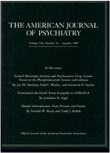The psychological effects of being a prisoner of war: forty years after release
Abstract
Forty years after the end of World War II, the authors compared a random sample of former Japanese-held Australian prisoners of war (POWs) with a group of non-POW combatants of the same era. The POWs were significantly more depressed than were the control subjects, but the two groups did not differ in prevalence of anxiety symptoms or alcohol problems. Apart from a higher rate of postwar duodenal ulcer in the POWs, the two groups had similar degrees of medical morbidity.
Access content
To read the fulltext, please use one of the options below to sign in or purchase access.- Personal login
- Institutional Login
- Sign in via OpenAthens
- Register for access
-
Please login/register if you wish to pair your device and check access availability.
Not a subscriber?
PsychiatryOnline subscription options offer access to the DSM-5 library, books, journals, CME, and patient resources. This all-in-one virtual library provides psychiatrists and mental health professionals with key resources for diagnosis, treatment, research, and professional development.
Need more help? PsychiatryOnline Customer Service may be reached by emailing [email protected] or by calling 800-368-5777 (in the U.S.) or 703-907-7322 (outside the U.S.).



